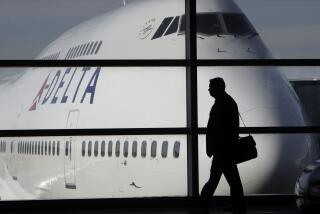Y2K Fears May Be Clipping Travelers’ Wings
- Share via
Whatever people have planned for the last New Year’s Eve of the millennium, apparently sitting aboard a jetliner isn’t high on the list.
American Airlines said Tuesday it will scrap 20% of its flights on Dec. 31 and 5% on Jan. 1 because of slow ticket sales, which some blame in part on travelers’ fears that the date change will cause computers to fail and lead to travel chaos. Airline officials, while conceding that advance reservations for that travel period are almost always slow, said this year so far appears to be unusually off.
“The reason for the cancellations simply is we’re not seeing the business,” American spokesman Tim Smith said. Instead of canceling about 10% of its New Year’s Eve flights, as American did last year, the No. 2 U.S. carrier is canceling double that number.
Smith said bookings are ahead of pace for other days around the holiday.
But to those who are traveling over the holiday weekend, the State Department warned that problems such as power failures, telephone outages or water shortages are likely in China, Russia and some other large nations because of the potential for technological problems stemming from the calendar rollover.
The warnings, intended for Americans considering traveling overseas during the New Year’s holiday, provided the most detailed picture to date from the U.S. government about where it anticipates trouble.
“This information will help Americans make their own decisions,” Undersecretary of State Thomas R. Pickering said.
No country’s Y2K situation was severe enough to issue a formal “travel warning” to discourage Americans from visiting, the State Department said, although it urged citizens traveling to Belarus to defer their trips or “be prepared to withstand power, water and heat outages during cold winter weather that can last several days or more.”
“The fact that we’re not issuing travel warnings at this time . . . may be taken by some as being reassuring,” said Kevin Herbert, the department’s director of overseas citizens services. “We would do a travel warning if we thought it was dangerous to go there.”
Travel industry observers say American’s move is not unusual, and they expect other airlines to pare back their schedules over the year-end holiday as well.
“I think you’ll probably see them all adjust their schedule that weekend,” said Tom Parson, publisher of online consumer magazine Best Fares. It’s not uncommon on holidays and weekends “for airlines to cut back on their traffic.”
But he said bookings this year will be particularly scant for a number of reasons. Most people who go away over New Year’s like to be at their destination by Dec. 31. New Year’s Day falls on Saturday, which is typically a light travel day, and will be compounded by some travelers who will stay home because of fears about year 2000 computer problems.
But the federal government and the airline industry say they are 95% done updating their computers to handle the calendar rollover. Some older computers read years by only the last two digits, leading to fears that they would malfunction by reading Jan. 1 as 1900 instead of 2000.
As of Tuesday evening, no other major airlines had taken similar action. United Airlines spokeswoman Susana Leyva said the carrier--the nation’s biggest--was in the process of evaluating traffic demand for the two days and said a decision on possible schedule changes could come within the next few weeks.
Meanwhile, Northwest Airlines spokesman John Austin said the company was “expecting to operate [its] normal schedule” over the period. “If there’s any change, we will announce that as soon as we’ve made our decision,” he said.
“Those two days are pretty soft, but I would hasten to add they are always pretty soft,” Austin said.
But with less than four months to go, this New Year’s, despite the hype, appears to be generating less of a travel flurry than expected. “We have not seen the number of bookings that we would have expected to see for millennium travel,” said Ada Brown, owner of Seaside Travel in Long Beach.
There is evidence that Southern Californians are planning to stay close to home for the turn of the new year. More than half of all bookings at Los Angeles-area hotels are coming from local residents, hotel operators report.
More to Read
Sign up for The Wild
We’ll help you find the best places to hike, bike and run, as well as the perfect silent spots for meditation and yoga.
You may occasionally receive promotional content from the Los Angeles Times.






